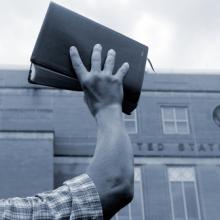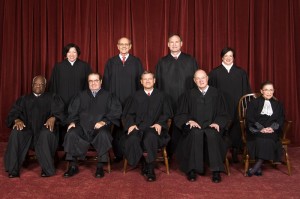Establishment Clause
While the Establishment Clause's scope is a matter of dispute, most Supreme Court experts predict the challenge to the Peace Cross will fail, with the justices potentially setting a new precedent allowing greater government involvement in religious expression.
After lawsuits and a Supreme Court decision, the Federal Emergency Management Agency has issued a new policy extending disaster relief to churches, synagogues and other congregations.
The decades-long battle over a cross erected on public land in California will drag out even longer now that the Supreme Court declined Monday to hear the case.
The conflict in Mount Soledad Memorial Association v. Trunk, is over a 43-foot cross that sits atop Mount Soledad on public land in San Diego. The cross was erected in the 1950s and has since become a veterans’ memorial.
The Supreme Court Monday declared that the Constitution not only allows for prayer at government meetings, but religious prayer.
“To hold that invocations must be non-sectarian would force the legislatures sponsoring prayers and the courts deciding these cases to act as supervisors and censors of religious speech,” Kennedy wrote for himself and the conservatives on the court.
Lawmakers and judges would otherwise have to police prayer, he wrote, involving “government in religious matters to a far greater degree than is the case under the town’s current practice of neither editing nor approving prayers in advance nor criticizing their contact after the fact.”
The Puritans sailed to these shores 400 years ago seeking freedom of religion, but freedom of their religion only. Earlier this year, a group of North Carolina lawmakers, apparently channeling the Puritans, tried to establish Christianity as the state religion.
Their action was prompted by a complaint filed by the American Civil Liberties Union. The ACLU noted that some county commissions and other governmental boards around the state opened meetings with prayer. While these various boards had policies that allowed for a multiplicity of religious voices, most prayers were offered in the name of Jesus Christ.
Eleven legislators, all white male Christians, backed a bill to codify Christianity in state law, saying the First Amendment to the U.S. Constitution does not trump the state’s rights. The effort died a quick and merciful death.
These misguided politicians forgot a simple truth – even if a state could mandate a public religion, that wouldn’t change what is in people’s hearts. As Roger Williams wrote in June 1670, “Forced worship stinks in God’s nostrils.” Williams, who was expelled by the Puritans and founded a religious colony in Rhode Island, knew firsthand the importance of religious freedom.
The Supreme Court agreed Monday to consider whether prayers can be offered at government meetings — a practice that’s been common in Congress and throughout the states for more than two centuries.
The religious expression case, which comes to the court from the town of Greece, N.Y., focuses on the first 10 words of the First Amendment, ratified in 1791: “Congress shall make no law respecting an establishment of religion.”
That Establishment Clause was violated, the 2nd U.S. Circuit Court of Appeals ruled last year, when the Greece Town Board repeatedly used Christian clergy to conduct prayers at the start of its public meetings. The decision created a rift with other appeals courts that have upheld prayer at public meetings, prompting the justices to step in.
The U.S. Supreme Court is set to begin hearing oral arguments this week in one of the most important church-state cases in decades. In Hosanna-Tabor Church v. Equal Employment Opportunity Commission, the court will consider whether a Lutheran school in Michigan is subject to a federal law banning discrimination based on a disability.
This morning I was touched and blessed by the tears of a Puerto Rican immigrant grandmother. She came to the U.S.






